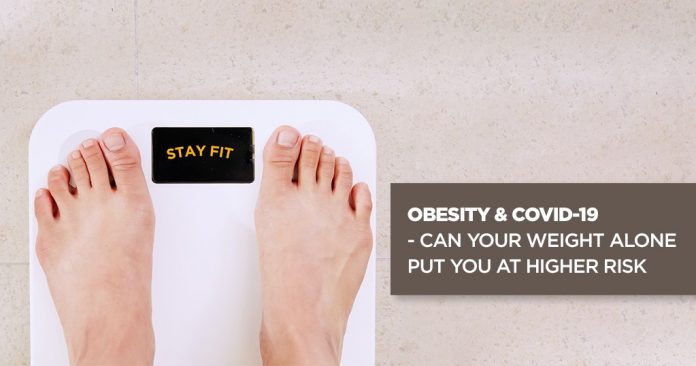Did you know that obesity is a risk factor for serious COVID-19 sickness? Obesity weakens the immune system and make you vulnerable to acute COVID-19 symptoms. It is also likely to cause other health conditions, such as diabetes and hypertension (high blood pressure).
Obesity v/s COVID-19
Obesity is often ignored by people and assumed as a non-serious condition. It is essential to realize that obesity itself is a major risk factor that can lead to severe COVID 19. *
Obese people are prone to developing several other health disorders too. BMI, known as body mass index, is a quick measurement of body fat. It helps you identify whether you are underweight, regular, or overweight (obese). A healthy adult individual will have a BMI between 18.5 kg/m2 and 24.9 kg/m2. Individuals, obese in this case, having a BMI of more than 30 are at an increased risk of developing hard to recover cases from COVID-19. **
Know your Body Mass Index
Calculate your own body mass index with simple calculation and find out whether you have weight related issues that can impact your health and put you at higher risk of COVID -19 infection . Follow the steps listed below:
- Grab a calculator or a pen and paper.
- Measure your height in meters (m) and weight in kilograms (kg).
- Put the values in the formula for BMI = weight (kg) / height^2 (m^2)
- Lastly, evaluate your category:
BMI Categories
(BMI (kg/m^2))
Underweight – Less than 18.5
Healthy (normal weight) – 18.5 – 24.9
Overweight – 25 – 29.9
Obesity – 30 or greater than 30
BMI of 30 or more than that increases a person’s risk of getting infected and developing complications of COVID-19. Obese individuals who develop this infection are likely to be put on lifesaving mechanical ventilation. Their survival chances could be decreased.
How are obesity and COVID 19 inter-related?
- Doctors believe that the COVID-19 symptom of breathlessness may be masked in obese people as they already suffer from breathing issues .
- Cytokine storm: It is an immune system -related and life-threatening complication of COVID-19. Obese people are likely to suffer and develop a cytokine storm. This can be identified by an aggressive inflammatory response where large amounts of cytokines are released.
- Doctors also believe that excess fat can assist the virus in sticking for a more extended period. This is due to the properties of fat particles and viruses.
What are the complications of obesity in COVID-19?
The reasons remain unclear, but statistics have proven that the more extended the recovery period, the more severe will be the damage to your lungs. The chance of survival of an obese person depends upon the severity of illness and other underlying conditions like diabetes or high blood pressure . A severely affected individual may need to be in a
n ICU or on mechanical ventilation for their survival.
If you or someone near you is experiencing any COVID-19 related symptoms of breathlessness, dry cough, or high fever, make sure to seek medical care instantly.
.
Call 1860-500-1066 to book an appointment.
How to prevent getting affected by COVID-19?
Preventive and precautionary measures are mandatory to follow. This should be done by all individuals, but those with high risk should be extra cautious and more vigilant. The following steps are recommended for obese people for their safety and health during the COVID-19 pandemic:
- You are required to be extra alert and vigilant during the pandemic. Practices like social distancing, usage of masks, and following proper hand hygiene is a must for all individuals. Obese people are required to be more conscious and alert and minimize unnecessary interaction.
- Management of underlying medical issues is a must. Obesity often comes along with other disorders like high blood pressure, heart conditions, and diabetes. Moreover, these conditions individually also increase the risk of a person to experience COVID-19 complications . Make sure that you are taking timely medications and proper sleep to manage your overall body condition.
- You should ensure that your practices support your immune system. Regularly exercising, timely sleep, yoga and a healthy diet will help you to boost the immune system naturally.
- You can consult with a doctor for weight management. Not only will it prevent you from COVID-19, but it will assist you with other health conditions related to obesity.
Conclusion
Obesity, along with the underlying health conditions, metabolic disorders, and breathing difficulties, can make you more vulnerable to severe COVID-19 infection. Obesity, along with the virus, can be a life-threatening combination.
Following preventive measures and maintaining your body weight can help you reduce your risk of getting infected by COVID-19.
Concerned you may be at risk of COVID-19?
If you or your loved ones are experiencing COVID-19 symptoms, you can call 1860 500 0202 to consult our virtual care provider 24/7. The provider will be able to help you determine if testing is required and advise you on what to do next.
.
Call 1860-500-1066 to book an appointment.


















